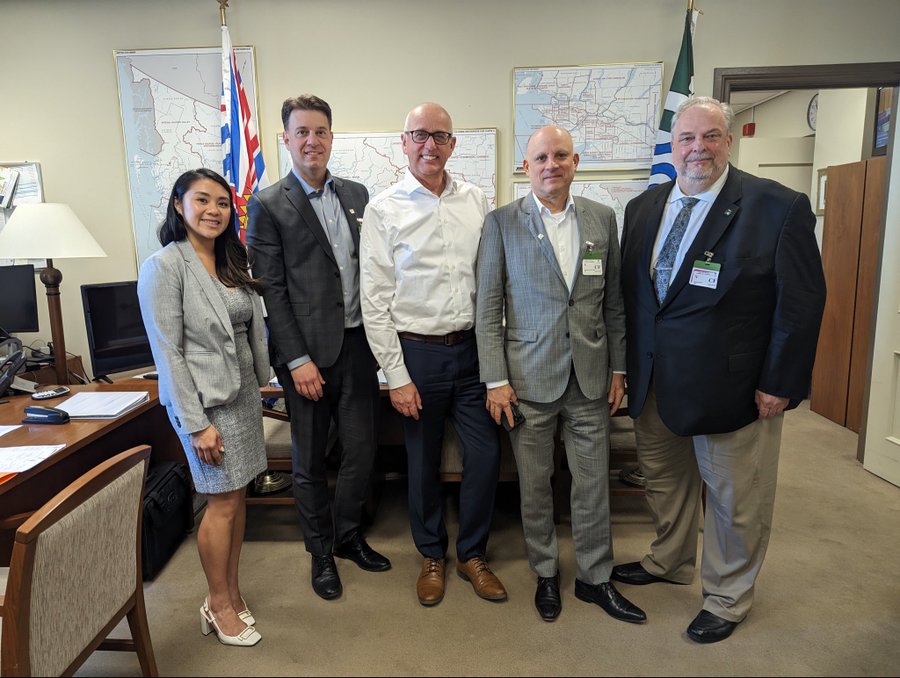As I was away last week, I wanted to thank Dawn Sondergaard for stepping in to post last week’s MMB and providing an insightful article focusing on mental health issues in the construction industry. This is a very important issue for our sector and is much more prevalent than previously thought. Increasing awareness, open discussion, and providing support and resources will be key to recognizing and coping with mental health well-being among our highly valued construction professionals at all levels of our industry. We look forward to participating in these conversations at our June 13 seminar, Let’s Talk Mental Health in the Construction Industry, featuring Corey Hirsch, former Canucks goaltender, and Olympic Silver medalist.
Last week HAVAN Board Chair Dave Deamer, from Polygon Homes and I, along with other BC delegates from Home Builders Associations across the province attended CHBA National’s annual Day on the Hill. Suspended for two years due to C19, and then again last year as scheduled dates aligned with the Freedom Convoy and truckers protest that paralyzed downtown Ottawa for almost three weeks, it was good to be back on the Hill.

Image: L -R Carmina Tupe’ CHBA-BC Director Policy and Government Relations, current HAVAN Board Chair Dave Deamer, Polygon Homes, MP Tako Van Popta, Alex Tavuchis, Coast Construction, Whistler, and HAVAN CEO, Ron Rapp.
This event sees HBA leadership from all three levels, and member delegates from across the country meeting with MPs, Cabinet ministers, and senior federal staff where industry presented our perspective on housing issues and provided comments and recommendations on how to address those issues. This year 12 teams of 4-5 met with 45 MPs, including the Honourable Minister of Housing and Diversity and Inclusion, Ahmed Hussen, NDP leader Jagmeet Singh, and the Honourable Minister of Immigration, Refugees and Citizenship Sean Fraser.
The Day on the Hill is a prime example of how our HAVAN members enjoy effective representation at the local, provincial, and federal level of government as a HAVAN member. The impact of federal involvement with the housing industry has been somewhat thin across the past several decades, but as housing issues have become a primary focus for all governments, the feds have pushed ahead with numerous initiatives to stimulate and expedite the supply of new housing to address the structural shortfall and affordability.
All three federal parties have recognized the need for more supply and have adopted platforms that serve to drive more supply at a faster rate, and for that reason, our delegates met MPs from all parties. Delegate teams were formed to be regional in nature with my team including, Dave Deamer, Polygon; Alex Tavuchis, Coast Construction, Whistler; and Carmina Tupe’, CHBA-BC Director of GR meeting with Tako Van Popta, MP for Langley-Aldergrove, John Aldag, MP for Cloverdale-Langley, Ken Hardie, MP for Fleetwood-Port Kells, and senior staff for Jenny Kwan, MP for Vancouver East who was detained but still wanted to be briefed on our message.
The messaging was well prepared for delegates and MPs by CHBA National with a comprehensive 12 page four colour brochure that captured all the salient information and distilled the issues into clear and readily understandable segments titled “Unlocking the Door to Homeownership”, and included a key-shaped USB loaded with the same information as “leave behinds” for MPs. The brochure was sent to all MPs prior to the Day, and the information and “key” were well received.
All delegates participated in a six-hour training and messaging session the day before our meetings with MPs that included the input and direction of seasoned political operatives and lobbyists from Earnscliffe who provided invaluable insight on how to conduct these meetings and effectively get our messaging across. This was extremely important to ensure our discussions and “asks” focused on the same key points and were reinforced by all delegates.
The big issue is that per the findings provided by CMHC we need to deliver 3.5 million new homes over the next ten years – doubling our current yearly volume nationally and regionally, but in the current environment we are seeing starts slowing and affordability worsening on account of:
- Higher interest rates
- Lack of housing supply
- Development taxes
- Red tape delays and NIMBYism
- Expensive changes to codes and standards
- Higher labour and material costs
- Labour shortages
Seven specific points were presented as a pathway to build 3.5 million additional homes and address affordability:
- Continue federal leadership but ensure a holistic approach.
- Remove barriers to homeownership for first-time buyers Fix stress test; Avoid more mortgage rule tightening, reintroduce 30-year amortization.
- Lower government-imposed costs that add to affordability challenges; Fix GST Rebate thresholds, Fix taxation on purpose-built rentals.
- Remove barriers within the home building process – roll out Housing Accelerator Fund; exclude industry from Underused Housing Tax requirements.
- Address labour shortages – Increase skilled worker immigration; support skilled workers.
- Support increased productivity. Support modular and factory-built construction
- Avoid adding costs through codes and regulations; Ensure affordability is a core code objective, innovation before regulation.
While the issues and the seven points are relatively succinct and on target, the time allocated to our meetings with MPs was pinned at 30 minutes, and while we presented the overall picture and seven points, our “asks” distilled down to three items that could be effective immediately with little or no cost.
- The reintroduction of 30 year or more mortgage amortization to specifically support first-time buyers.
- Lower interest rates, but recognizing inflation needs to be managed then lower the overall stress test: thresholds, and more so for 7 – 10-year mortgages to accommodate first-time buyers.
- Fix the GST to increase thresholds for rebates on new housing which have not been adjusted since 1991, and exempt or provide substantial rebates for purpose-built rental development and construction costs to encourage and support supply of new rental homes.
Our meetings were overall very successful in communicating those messages, and our MPs were both well informed and engaged with some meetings extending to almost an hour in a forum where we were both preceded and followed by numerous other interest groups pitching their “asks”. It is a testament to our collective efforts that both Housing Minister Hussen and Immigration Minister Fraser attended and spoke at the evening reception hosted by CHBA, with several other MPs and staffers.
The Day on the Hill is a true indication of “value for membership” as belonging to HAVAN provides access to decision-makers at the federal level, and we saw many of the themes and recommendations previously pitched being incorporated into the housing-friendly federal budget most recently tabled, and the housing action strategies that are stemming from it. This “value” extends provincially as well where the unprecedented access we have earned has brought BC Housing Minister Ravi Kahlon to the HAVAN Awards, to this coming weekend’s Georgie Awards, and sees a panel discussion on May 19th as part of the provincial meetings that will include Minister Kahlon, Minister for Municipal Affairs, Anna Kang, and Minister of Energy, Mines and Low Carbon Innovation, Josie Osbourne.
Our government relations activities are strong and growing stronger with HAVAN represented in many municipal DLCs, DACs, provincial roundtables, and committees, and with our input and comments being sought out along with invitations to participate in UBCM, LMLGA, and other conferences and discussions at every level, and across Metro Vancouver municipalities. We look forward to the Day on the Hill next spring, and provincially the Day at the BC Legislature projected for the fall of this year which will follow the same model as the day in Ottawa.
HAVAN continues to work with CHBA BC and CHBA to advocate for all levels of government to work together to address the challenges of the housing industry including zoning restrictions, density limits, and NIMBYism.
Looking to stay up-to-date on Metro Vancouver’s residential housing industry? Sign up for Ron’s weekly Monday Morning Briefing and other HAVAN emails here.
Quick Bites …
- While in Ottawa last Monday and participating in the noted orientation and training session my phone exploded with the news, and then fallout, from the presentation of the forensic audit of BC Housing by Premier Eby and Housing Minister Kahlon. The audit revealed a series of conflicts of interest and or financial impropriety involving former BC Housing CEO, Shayne Ramsey, and his wife Janice Abbott, CEO of Atira, BC’s largest non-profit housing provider. It is unfortunate that these allegations might taint the good work of both organizations, and we wish newly appointed BC Housing CEO Vincent Tong all the best in sorting out issues identified in the audit and charting a fresh course for BC Housing to deliver on the ambitious program for housing mandated by the province.
- City of Vancouver staff presented to Council a report entitled: Prioritization Framework for Planning Policy and Processing Applications, a report intended to seek direction from Council on a framework that prioritizes applications caught in the approvals backlog to focus on projects that are best positioned to move forward into construction and delivery. Of concern to our sector, is that the focus was principally on non-profit, below-market, and purpose-built rentals with very little mention of expediting market housing of any sort. While the concept of triage and prioritizing applications is welcome news, deferring market housing applications, including ones centered on gentle infill densification directed to the missing middle, will further exacerbate the lack of supply in the market for products and purchasers that do not qualify as below market.
- The elevated temperatures that were experienced across BC this past weekend and extending into this week were from 10 to 15 degrees above seasonal norms. With temps extending into the 30s and breaking many records, it points to further regulation being contemplated to offset the potentially deadly effects of heat events. The BC Coroner’s report following the “heat dome” in 2021 called for the inclusion of cooling/ air conditioning as a code item. Emergency alert systems and expanded cooling centers/ facilities are going to help offset the threat posed by such heat events, and introducing cooling into vulnerable properties such as long-term care facilities are positive steps. As of now “cooling” has not been defined and could include opening windows, fans, enhanced ventilation, and or air conditioning via split systems, or heat pumps. The implications are significant in energy modelling, direct hard costs, and hydro capacities.
- Ryan Beedie of Beedie Developments has set a Guinness World Record, but not in relation to any of Beedie’s development and or construction operations. Follow this link to see his accomplishment.












